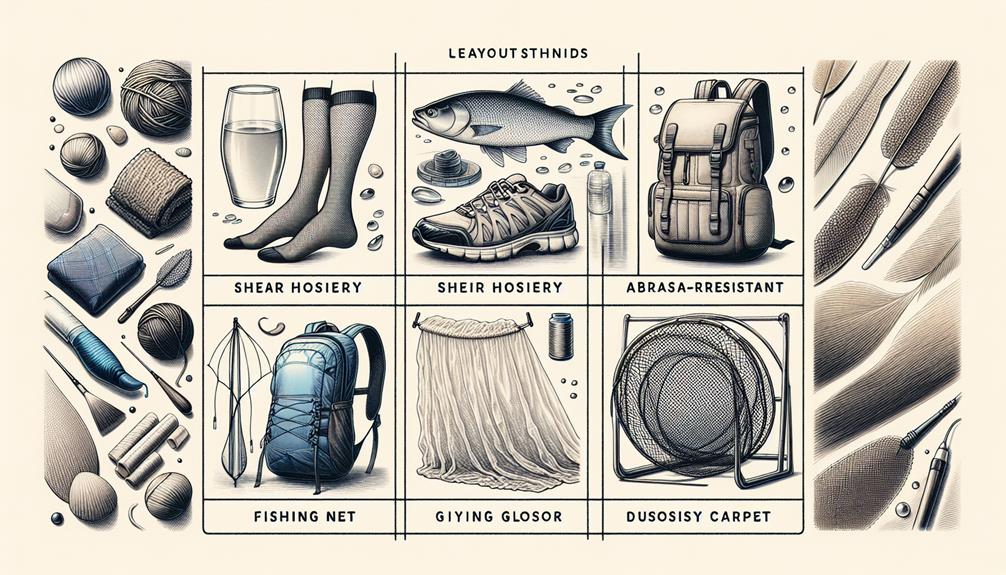I've gotten to know my fair share of materials, and when it comes to versatility, the five main types of nylon really stand out. Nylon 6,6 is great for anything needing to be waterproof and durable, like outdoor gear. Nylon 6, on the other hand, is both tough and lightweight, making it a favorite in industrial uses. Nylon 6,10 brings chemical resistance to the table, which is perfect for automotive parts. Nylon 4,6 can handle high heat, useful in engine components. Lastly, Nylon 12 is all about flexibility, ideal for various consumer goods. Stick around, and you'll see just how these materials transform products!
Table of Contents
Key Takeaways
- Nylon 6,6 is synthesized from adipic acid and hexamethylenediamine, ideal for waterproof gear.
- Nylon 6 features high tensile strength and cost-effectiveness for industrial use.
- Nylon 6,10 is known for its chemical resistance and durability in automotive and sports gear.
- Nylon 4,6 withstands high heat and is used in engine components and industrial settings.
- Nylon 12 is flexible and has low moisture absorption, suitable for automotive and medical applications.
Nylon 6,6: Waterproof Wonders
While exploring the various types of nylon, it's clear that Nylon 6,6 stands out due to its impressive waterproof properties. This feature alone makes it a top pick for anything that's got to stay dry—think swimwear and outdoor gear. What's really cool is how it's made. Nylon 6,6 is synthesized from two main ingredients: adipic acid and hexamethylenediamine. This combo not only gives it waterproof qualities but also makes it super resistant to chemicals and abrasion.
Why does this matter? Well, if you're into any kind of sports or outdoor activities, you know how important it's that your gear can handle rough conditions without falling apart. That's where Nylon 6,6 comes into play. It's not just for keeping you dry but also ensures your gear lasts longer, no matter how tough things get. Plus, its resistance features make it a prime material for automotive components. Cars need materials that can withstand all sorts of chemicals and wear, and Nylon 6,6 fits the bill perfectly.
Nylon 6: Tough and Lightweight
If you're looking for a material that's both tough and lightweight, Nylon 6 might just be your best bet. What stands out with Nylon 6 is its impressive toughness. This material isn't just about being strong; it's about being strong where it counts. With high tensile strength, it can withstand a lot of stress before it breaks, making it ideal for items that need to be durable.
Nylon 6 is also lightweight, which makes it a perfect pick for applications where you don't want the extra bulk, but you need the strength. It's a favorite in industries like automotive and textiles, where these properties are essential. Plus, it's quite abrasion resistant and chemical resistant, handling wear and tear like a champ and resisting damage from various chemicals.
Another fantastic trait of Nylon 6 is its elasticity. This flexibility makes it easier to work with, especially in manufacturing settings. Whether it's being molded into car parts or spun into fibers for fabrics, its elasticity is a huge advantage.
Lastly, it's cost-effective. Balancing performance with affordability, Nylon 6 offers a lot of bang for your buck, making it a go-to material in many industrial applications.
Nylon 6,10: Chemical Resistant
Nylon 6,10 stands out for its remarkable chemical resistance, making it a top choice in sectors that often deal with harsh chemicals. If you're dealing with environments where chemical exposure is a daily reality, you'll find that Nylon 6,10 is an invaluable ally. This type of nylon isn't just about resisting damage from chemicals; it's about maintaining performance over time, even under tough conditions.
What makes Nylon 6,10 so special? It's the balance of properties it offers. Not only does it have high strength and durability, but it also boasts excellent abrasion resistance. This means that in addition to standing up to chemicals, it can handle wear and tear from physical use. It's a tough material, perfect for making things that need to last.
You'll often find Nylon 6,10 in automotive components, sports gear, and safety equipment. These are all areas where both chemical and abrasion resistance are crucial. Imagine car parts that resist engine chemicals or protective gear that won't wear out easily, even with rough use.
Nylon 4,6: Heat and Strength
I've discovered that Nylon 4,6 is unbeatable when it comes to withstanding high heat and maintaining its strength in extreme conditions. This material is a real game-changer for those demanding applications where lesser materials might fail. Thanks to its heat resistance and high strength, it stands up to the challenge in harsh conditions without breaking a sweat.
What's more, Nylon 4,6 isn't just tough against heat; it also shows off impressive chemical resistance. This makes it a top pick for engine components in automotive sectors and various industrial settings where chemicals are a daily encounter. Its ability to resist wear and tear from chemical exposure ensures that components last longer and perform better.
Another standout feature of Nylon 4,6 is its dimensional stability. Even under high temperatures, it holds its shape and size, which is crucial for maintaining the integrity of mechanical parts. This stability, combined with its mechanical strength, makes Nylon 4,6 ideal for critical parts in safety gear and other automotive applications. Overall, if you're dealing with tough jobs in tough environments, Nylon 4,6 has got your back.
Nylon 12: Flexibility Focus
When it comes to flexibility, Nylon 12 really stands out from the crowd. This type of nylon is a go-to for any applications where bending without breaking is key. Think protective clothing or electrical insulation, where materials must endure bending and twisting while still protecting or insulating. What's more, Nylon 12's low moisture absorption means it doesn't swell or degrade easily, which is a huge plus in wet or humid environments.
Nylon 12 is also known for its impressive chemical resistance, making it perfect for use in harsh environments where other materials might suffer. It doesn't just hold up well against chemicals; it maintains its flexibility even under tough conditions. That's a rare combo and a big reason why industries that face extreme conditions lean heavily on Nylon 12.
Its versatility doesn't end there. The unique properties of Nylon 12 make it useful in a variety of other industries too. Whether it's used in automotive applications, medical devices, or even consumer goods, Nylon 12 offers a reliable solution that combines flexibility with durability. It's these features that underscore its broad appeal and why it's cherished across so many fields.
Frequently Asked Questions
What Are the 4 Types of Nylon?
I'll list four types of nylon for you: Nylon 6, Nylon 6,6, Nylon 4,6, and Nylon 510. Each type has unique properties making them suitable for different industrial and scientific applications.
What Is the Most Common Type of Nylon?
The most common type of nylon is Nylon 6. It's tough, highly tensile, and elastic, making it perfect for durable applications in various industries like textiles and industrial machinery.
What Are 4 Used for Nylon?
I'm not sure what you're asking about the "4 used for nylon." Could you clarify? Are you referring to specific applications or types of nylon like Nylon 6 or Nylon 6,6?
How Many Grades of Nylon Are There?
I've learned there are several grades of nylon, each tailored for different uses due to their unique properties. These range from general-purpose options to those specialized for industrial and scientific applications.
- What Types of Clothing Are Nylon? - April 19, 2024
- What Are the 5 Types of Nylon? - April 19, 2024
- What Are the Characteristics of Nylon Fabric? - April 19, 2024








